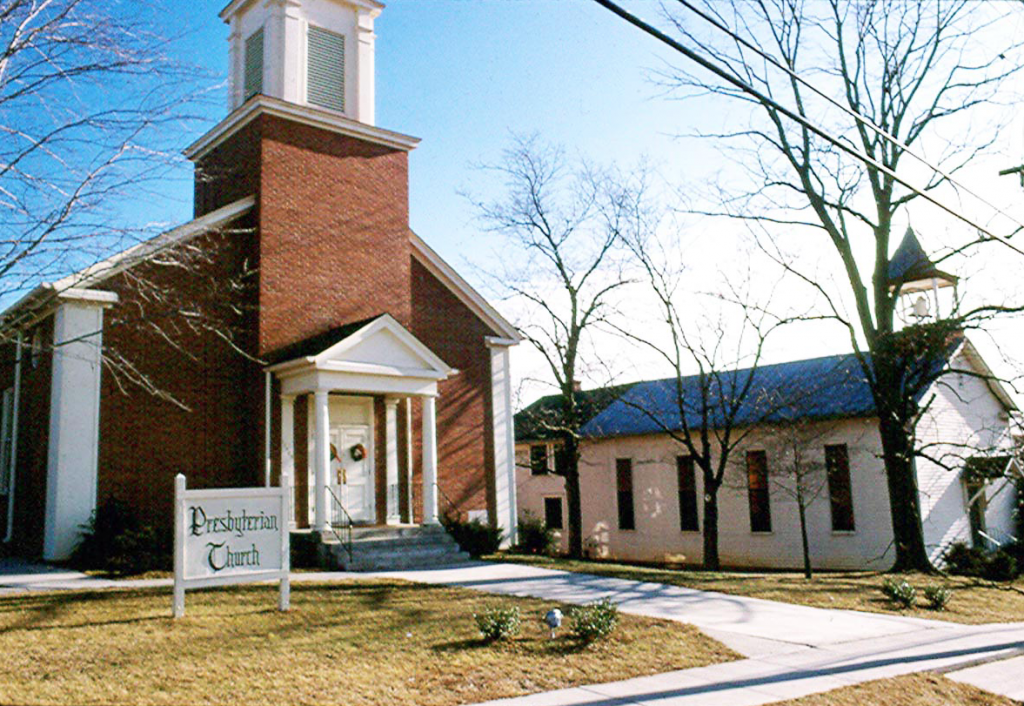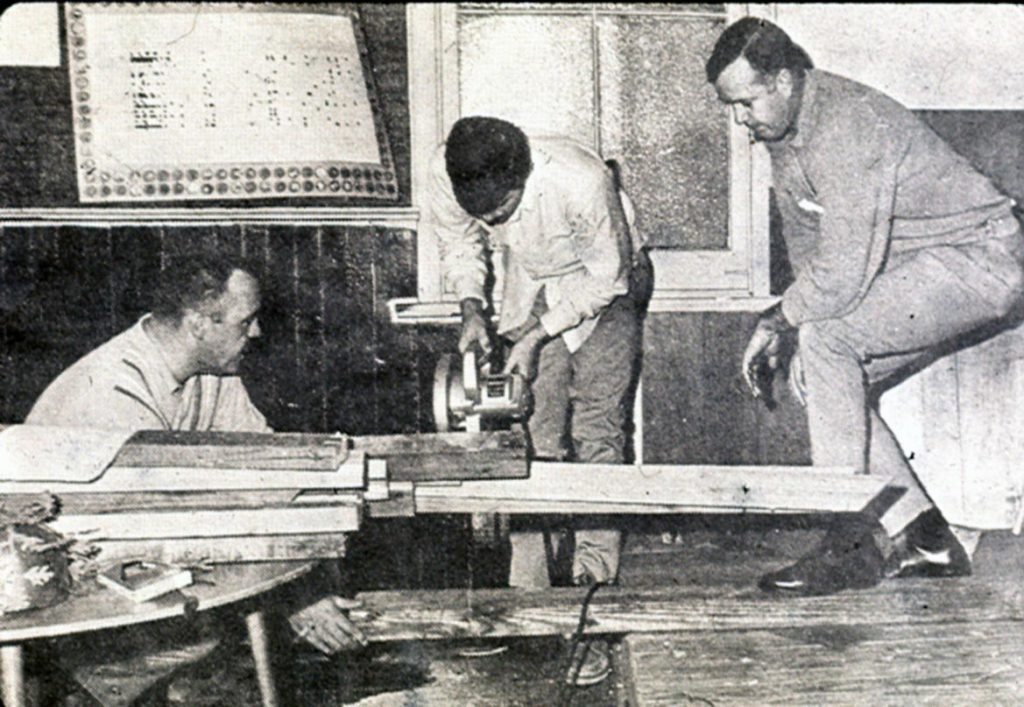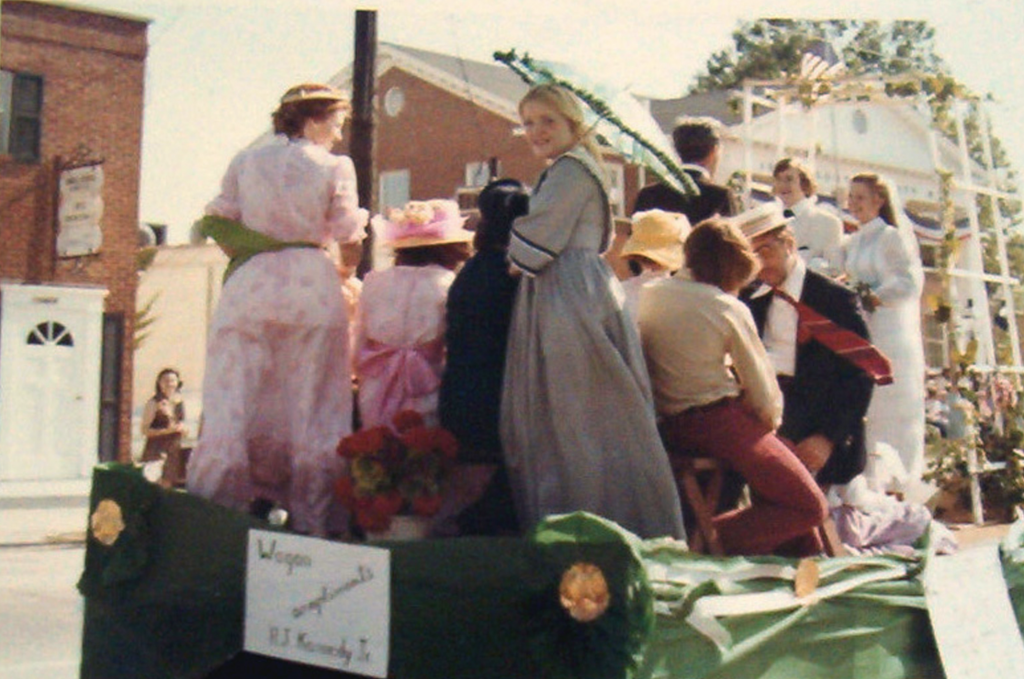The Mansfield Players
Writer / Beth Wilder, Director Jeffersontown Historical Museum
It all began with a comment to her minister.
In the winter of 1969-70, Betty Elswick, the Jeffersontown branch librarian, told her minister, Rev. James Tyrrell of Jeffersontown Presbyterian Church, that she felt the community needed a little theater group. In February, the two of them, along with Rhoda Peters and Carter Ormsby, spoke with Jon Jory, producing director of Actors Theatre, in the hopes he could give them advice on how to organize their own little theatrical troupe. It worked, and by April of that year, the newly-formed company had four sell-out performances of the play, “Our Town.”
The establishment of the new acting troupe was handled quite professionally. James Tyrell was named business manager, an attorney was consulted, and a non-profit corporation was formed. After that, a subscription drive was launched to cover the cost of sets and costumes. Since a new brick church had recently been constructed for the congregation, volunteers worked to convert the old frame Presbyterian Church at 10409 Taylorsville Road into a 110-seat theater. Construction materials were donated but when builders ran out of lumber for the stage, old church pews were taken apart and used to finish the job.
Libby McGuire suggested the group call itself the “Mansfield Players.” Mansfield was the name of the estate of Henry Watterson, who, in addition to being the renowned editor of the Courier-Journal and Louisville Times, was also a great proponent of the arts.
Auditions for the Mansfield Players’ first production, “Our Town,” were held in February 1970, with more than 80 people trying out for roles. Rhoda Peters directed the production, Betty Elswick produced it, James Tyrell acted as stage manager and Carter Ormsby was technical director. The premier performance of “Our Town” was presented on April 8 to a sell-out crowd to be followed by three more sold-out performances.
After the success of their first play, the Mansfield Players received many letters of congratulations to the cast and crew, not the least of which was a mysterious telegram that read: “Heaven was rolling tonight. Your performance was great. Glad to be your Patron Saint. (signed) Marse Henry Watterson.”
It was later discovered that Jack Durrett, president of the Jeffersontown Chamber of Commerce, had sent the fondly received note, because he “just thought it was a good idea.”
According to Rhoda Peters, the play had been “a trial to see if (the theater) would interest the community.” Because of the excellent response by the public and the request of teens to work on another production during the summer, it was decided next to stage the musical “Oliver.” With a cast and crew of 80 children and teenagers, a rather large crowd was expected, so the Mansfield Players decided to rent the Cochrane Elementary School auditorium for three nights, with the hope of selling 250 tickets per performance. Expectations were exceeded, however, as more than 900 people turned out to view the musical.
Four productions were planned for the 1970-71 winter season. They included “Harvey,” “A Winter Festival” (of readings and dramatic sketches), “The Miracle Worker,” and “The Importance of Being Earnest.” “The Miracle Worker” actually opened with a benefit performance to raise funds to send the Jeffersontown High School Band to Washington D.C. for the Cherry Blossom Festival, and proceeds from the next show, “The Importance of Being Earnest,” were given to the WHAS Crusade for Children.
The summer production of “The Music Man” that year was nothing less than spectacular. The cast included 105 singers, dancers and actors plus 92 members of the Jeffersontown High School Marching Chargers. Some of the parts were double cast so the lead actors could alternate performances and each child would get to perform twice.
The 1971-72 season included “The Rainmaker,” “I Remember Mama” and “The Lark.” The Mansfield Players regularly put on at least three shows a season through 1975, and among some of their other productions were “Gaslight,” “Blithe Spirit,” “The Male Animal,” “The Fantasticks,” “Oklahoma” and “You Can’t Take It with You.” A 1971 review in the Voice-Jeffersonian newspaper by Drama Critic Nancy Niles Sexton stated that “what these people at the Mansfield Players in Jeffersontown are doing is a tremendous credit to their community and to the East End as a whole. They have worked tirelessly and the effort shows. Their plays have definitely reached the level which demands critical review and that in turn hopefully inspires further artistic growth.”
The Mansfield Players were open to anyone age six and up, even from outside the community. Many well-known figures in Jeffersontown – from teachers to doctors – had roles either on stage or behind the scenes in Mansfield Players productions. According to Mrs. Chris Sharpe, who directed 1973’s “Blithe Spirit,” the theater group was “not looking for professionals for the roles, we want people who simply have the desire to act.”
Others volunteered to serve as producers, set designers, costumers, directors and publicity chairmen – each play typically had its own set of individuals in charge, to make sure everything ran smoothly. Even local businesses got in on the act by selling tickets for them – most tickets typically ranged between $1-$2.50 each, but season tickets were available for $6, individual and patron memberships for $10 & $25 and sponsorships for $50 were also available and came with voting privileges.
While teens quite often filled a large portion of roles in the various shows, they were not normally allowed to take complete charge of their own productions. That did occur, however, for 1974’s “Show of Shows,” when a group of teens convinced the Mansfield Players’ board that “they could help stir up more interest in the community and help advertise the dramatic group’s activities,” if they were allowed to produce their own performance. It was agreed to on a trial basis, with the promise that if all went well the teens could have their own show once a year. The teens held their own auditions, designed their own sets and organized their own rehearsals – they remembered everything except the advance publicity, but they managed to get the word out in plenty of time to still attract a good crowd.
By the late 1970s, the Mansfield Players had moved their theater to the Greenbriar Shopping Center on Galene Drive but interest in producing shows eventually tapered off. As Rhoda Peters noted in 1971, “this has been strictly a hometown, do-it-yourself sort of thing, because people out here felt we needed something.”
It was wonderful while it lasted, and is a testament to the spirit and cohesive nature of Jeffersontown residents, who can accomplish anything once they set their minds to it. The Mansfield Players added a great deal of culture, class and fun to the community of Jeffersontown, and everyone involved in those productions has reason to be proud.









